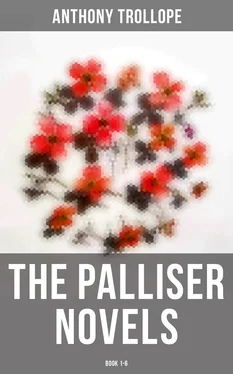Miss Vavasor had made for herself a certain footing in society, though I am disposed to doubt her right to be considered as holding a place among the Upper Ten Thousand. Two classes of people she had chosen to avoid, having been driven to such avoidings by her aunt's preferences; marquises and such-like, whether wicked or otherwise, she had eschewed, and had eschewed likewise all Low Church tendencies. The eschewing of marquises is not generally very difficult. Young ladies living with their fathers on very moderate incomes in or about Queen Anne Street are not usually much troubled on that matter. Nor can I say that Miss Vavasor was so troubled. But with her there was a certain definite thing to be done towards such eschewal. Lady Macleod by no means avoided her noble relatives, nor did she at all avoid Alice Vavasor. When in London she was persevering in her visits to Queen Anne Street, though she considered herself, nobody knew why, not to be on speaking terms with Mr.. Vavasor. And she strove hard to produce an intimacy between Alice and her noble relatives—such an intimacy as that which she herself enjoyed;—an intimacy which gave her a footing in their houses but no footing in their hearts, or even in their habits. But all this Alice declined with as much consistency as she did those other struggles which her old cousin made on her behalf,—strong, never-flagging, but ever-failing efforts to induce the girl to go to such places of worship as Lady Macleod herself frequented.
A few words must be said as to Alice Vavasor's person; one fact also must be told, and then, I believe, I may start upon my story. As regards her character, I will leave it to be read in the story itself. The reader already knows that she appears upon the scene at no very early age, and the mode of her life had perhaps given to her an appearance of more years than those which she really possessed. It was not that her face was old, but that there was nothing that was girlish in her manners. Her demeanour was as staid, and her voice as self-possessed as though she had already been ten years married. In person she was tall and well made, rather large in her neck and shoulders, as were all the Vavasors, but by no means fat. Her hair was brown, but very dark, and she wore it rather lower upon her forehead than is customary at the present day. Her eyes, too, were dark, though they were not black, and her complexion, though not quite that of a brunette, was far away from being fair. Her nose was somewhat broad, and retroussé too, but to my thinking it was a charming nose, full of character, and giving to her face at times a look of pleasant humour, which it would otherwise have lacked. Her mouth was large, and full of character, and her chin oval, dimpled, and finely chiselled, like her father's. I beg you, in taking her for all in all, to admit that she was a fine, handsome, high-spirited young woman.
And now for my fact. At the time of which I am writing she was already engaged to be married.
CHAPTER II.
LADY MACLEOD.
Table of Contents
I cannot say that the house in Queen Anne Street was a pleasant house. I am now speaking of the material house, made up of the walls and furniture, and not of any pleasantness or unpleasantness supplied by the inmates. It was a small house on the south side of the street, squeezed in between two large mansions which seemed to crush it, and by which its fair proportion of doorstep and area was in truth curtailed. The stairs were narrow; the dining-room was dark, and possessed none of those appearances of plenteous hospitality which a dining-room should have. But all this would have been as nothing if the drawing-room had been pretty as it is the bounden duty of all drawing-rooms to be. But Alice Vavasor's drawing-room was not pretty. Her father had had the care of furnishing the house, and he had intrusted the duty to a tradesman who had chosen green paper, a green carpet, green curtains, and green damask chairs. There was a green damask sofa, and two green arm-chairs opposite to each other at the two sides of the fireplace. The room was altogether green, and was not enticing. In shape it was nearly square, the very small back room on the same floor not having been, as is usual, added to it. This had been fitted up as a "study" for Mr. Vavasor, and was very rarely used for any purpose.
Most of us know when we enter a drawing-room whether it is a pretty room or no; but how few of us know how to make a drawing-room pretty! There has come up in London in these latter days a form of room so monstrously ugly that I will venture to say that no other people on earth but Londoners would put up with it. Londoners, as a rule, take their houses as they can get them, looking only to situation, size, and price. What Grecian, what Roman, what Turk, what Italian would endure, or would ever have endured, to use a room with a monstrous cantle in the form of a parallelogram cut sheerly out of one corner of it? This is the shape of room we have now adopted,—or rather which the builders have adopted for us,—in order to throw the whole first floor into one apartment which may be presumed to have noble dimensions,—with such drawback from it as the necessities of the staircase may require. A sharp unadorned corner projects itself into these would-be noble dimensions, and as ugly a form of chamber is produced as any upon which the eye can look. I would say more on the subject if I dared to do so here, but I am bound now to confine myself to Miss Vavasor's room. The monstrous deformity of which I have spoken was not known when that house in Queen Anne Street was built. There is to be found no such abomination of shape in the buildings of our ancestors,—not even in the days of George the Second. But yet the drawing-room of which I speak was ugly, and Alice knew that it was so. She knew that it was ugly, and she would greatly have liked to banish the green sofa, to have re-papered the wall, and to have hung up curtains with a dash of pink through them. With the green carpet she would have been contented. But her father was an extravagant man; and from the day on which she had come of age she had determined that it was her special duty to avoid extravagance.
"It's the ugliest room I ever saw in my life," her father once said to her.
"It is not very pretty," Alice replied.
"I'll go halves with you in the expense of redoing it," said Mr.. Vavasor.
"Wouldn't that be extravagant, papa? The things have not been here quite four years yet."
Then Mr. Vavasor had shrugged his shoulders and said nothing more about it. It was little to him whether the drawing-room in Queen Anne Street was ugly or pretty. He was on the committee of his club, and he took care that the furniture there should be in all respects comfortable.
It was now June; and that month Lady Macleod was in the habit of spending among her noble relatives in London when she had succeeded in making both ends so far overlap each other at Cheltenham as to give her the fifty pounds necessary for this purpose. For though she spent her month in London among her noble friends, it must not be supposed that her noble friends gave her bed or board. They sometimes gave her tea, such as it was, and once or twice in the month they gave the old lady a second-rate dinner. On these occasions she hired a little parlour and bedroom behind it in King Street, Saint James's, and lived a hot, uncomfortable life, going about at nights to gatherings of fashionable people of which she in her heart disapproved, seeking for smiles which seldom came to her, and which she excused herself for desiring because they were the smiles of her kith and her kin, telling herself always that she made this vain journey to the modern Babylon for the good of Alice Vavasor, and telling herself as often that she now made it for the last time. On the occasion of her preceding visit she had reminded herself that she was then seventy-five years old, and had sworn to herself that she would come to London no more; but here she was again in London, having justified the journey to herself on the plea that there were circumstances in Alice's engagement which made it desirable that she should for a while be near her niece. Her niece, as she thought, was hardly managing her own affairs discreetly.
Читать дальше












